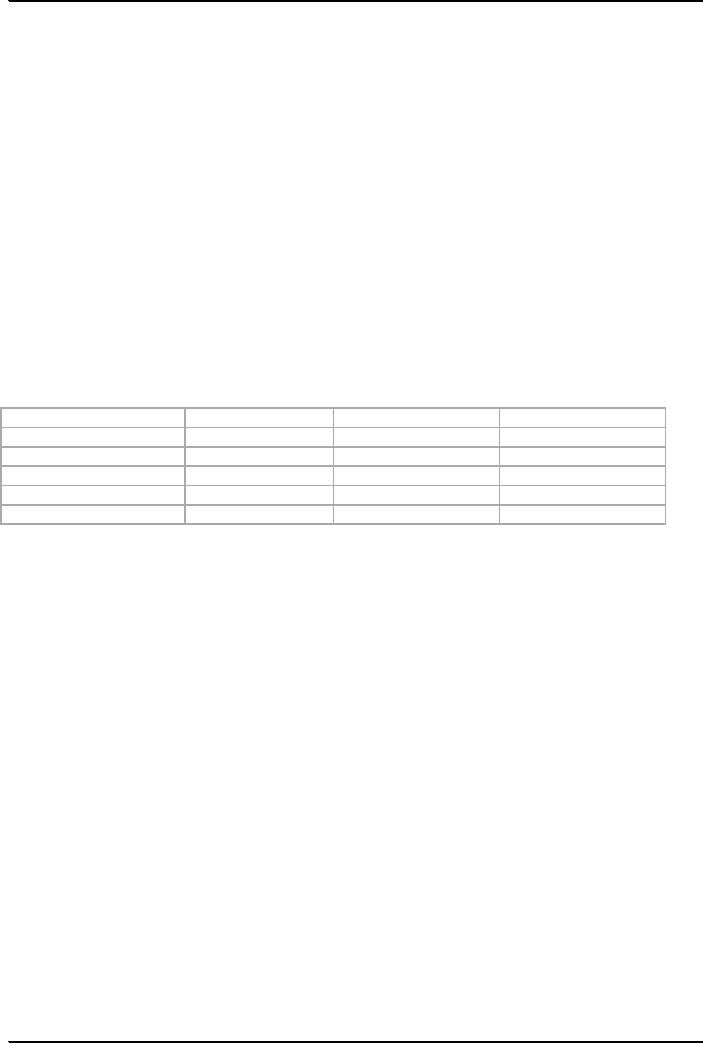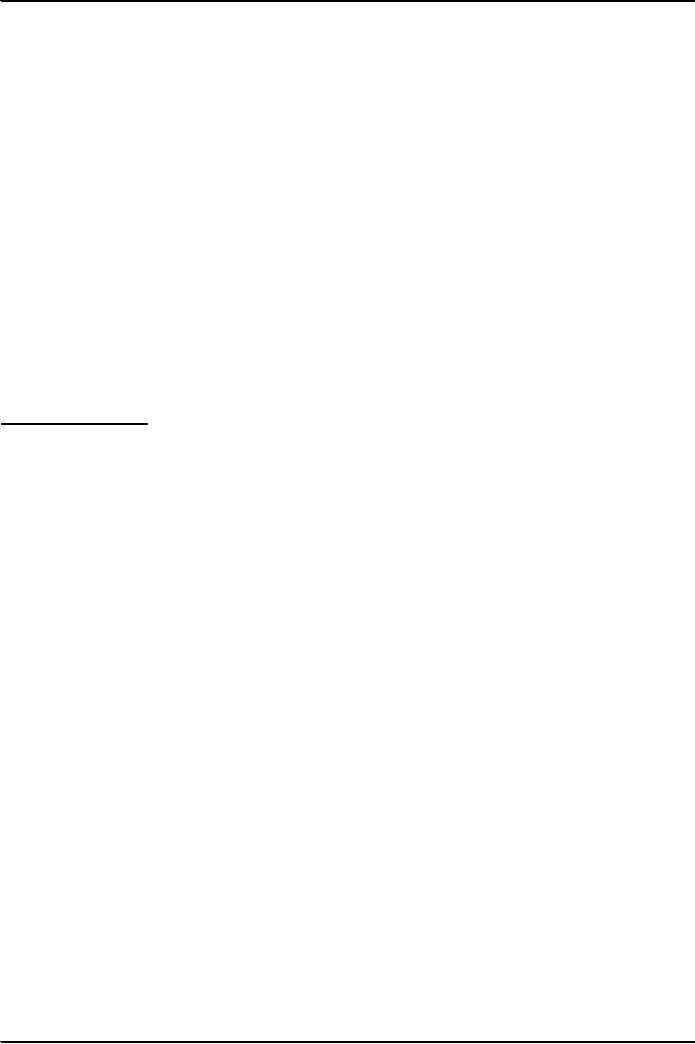 |
Gratuity Exercise |
| << Tax treatment of Gratuity |
| PROVIDENT FUND >> |

Taxation
Management FIN 623
VU
MODULE
6
LESSON
6.30
SALARY
AND ITS COMPUTATION
GRATUITY
RECEIVED UNDER SIXTH
SCHEDULE
In
the case of employees
covered by approved gratuity
under Sixth
Schedule:
Any
gratuity received by an employee
from a gratuity fund approved by the
Commissioner of Income
Tax
in
accordance with the rules contained in
Part III of the Sixth Schedule, is
fully exempt under clause
(13)(ii),
Part I
of Second Schedule.
Exercise-2
on Gratuity:
Mr. A,
an employee of a private Company,
received Rs. 1,000,000 at the time of
retirement on 01-10-2006,
from a
gratuity fund approved by the
Commissioner of Income Tax under Sixth
Schedule.
Other
information/data for tax year
2007 is given here under:
1.
Basic salary
Rs.360,000
2.
Bonus
Rs.
90,000
3.
Gardener
Rs.
48,000
Compute
taxable income and tax thereon
for tax year 2007.
Solution
of Exercise 2:
Tax
payer: Mr. A
Tax
year: 2007
Residential
Status: Resident
NTN:
000111
Computation
of taxable income and tax
thereon:
In
Rs
Particulars
Total
income
Exempt
Income
Taxable
Income
Basic
Salary
360,000
Nil
360,000
Bonus
90,000
Nil
90,000
Gardener
48,000
Nil
48,000
Gratuity
1,000,000
1,000,000
Nil
Taxable
Income
498,000
Tax
Liability:
Tax
payable = 498,000 x 3.5%=17,430
N-1
Gratuity
fund approved by the Commissioner of
Income Tax is exempt under
Sixth Schedule.
Treatment if
Gratuity Approved by Central Board of
Revenue
In
Case Gratuity Approved Under
clause (13)(iii), Part I, Second
Schedule-CBR approval
� First
gratuity received up to Rs.
200,000 is exempt.
� Amount
exceeding Rs. 200,000/- will
be taxable as salary.
Treatment of
Gratuity not Covered under
any other Clause of Part I of 2nd
Schedule:
Gratuity
received by an employee/family on retirement or
death shall be exempt from
tax to the extent of
the
least of the following:
a. 50% of
amount receivable
Or
b. Rs.
75,000
However,
this exemption is not available in the
following cases:
� If
gratuity is received outside
Pakistan
� Received
by a director of a company who is
not a regular employee of the
company
� If
received by a non resident
person
� If recipient
has already received any
gratuity from the same or
any other employer
Exercise-3
Mr. A
retired on 01.01.2007, he received
gratuity amounting Rs. 600,000.
The gratuity fund was
not
approved by the
authorities stipulated in the ordinance. Explain
treatment of gratuity received by the
said
employee
under the provisions of the Ordinance.
Solution:
51

Taxation
Management FIN 623
VU
As per
clause (13)(iv), Part I of Second
Schedule, exemption is available as
follows:
50% of
Rs. 600,000 received = Rs.
300,000 or Rs.75,000, whichever is
less.
In this
case Rs.75,000 is exempt and
balance amount of Rs.225,000 will be
taxable.
Gratuity:
Points to Remember:
� Gratuity
will be ignored while computing
taxable income and tax
liability of a deceased
person.
� In
case the gratuity is received by
legal heirs, where employee
dies before retirement the gratuity
would
be
taxable in the hands of legal
heirs of the deceased.
Pension
Pension
is the amount received on account of past
services/employment
Tax
treatment of Pension
Pension
Totally Exempt
If
received by a citizen of Pakistan under
clause (8) part I of second
Schedule. Provided
As
stated above the recipient
should be citizen of Pakistan
The
recipient must not be working
for the same employer for
any remuneration.
In
case a person receives
pension from more than
one employer, the exemption
shall be available to the
higher of the
pensions received by
him.
Pension
Received by Ex-Government Employees and Members of
Armed Forces.
Any
pension received by employees of
federal govt./Provincial govts.
Members of Armed Forces
of
Pakistan
or granted under the rules to their
families is exempt from tax under
clause (9), part I of
second
Schedule
Clauses
(8),(9), (12), (16), (17) Part I of Second
Schedule.
Clause
(8)
Any
pension received by a citizen of Pakistan
from a former employer,
other than where the
person
continues
to work for the employer (or an
associate of the employer).
Provided
that where the person
receives more than one
such pension, the exemption
applies only to the
higher of the
pensions received.
Clause
(9)
Any
Pension:
(i)
Received in respect of services
rendered by a member of the Armed
Forces of Pakistan of
Federal
Government
or a Provincial Government;
(ii)
Granted under the relevant rules to the
families and dependents of
public servants or members of
the
Armed
Forces of Pakistan who die
during service.
Clause
(12)
Any
payment in the nature of commutation of
pension received from
Government or under any
pension
scheme
approved by the Central Board of Revenue for the
purpose of the clause.
Clause
(16)
Any
income derived by the families and
dependents of the "Shaheeds" belonging to
Pakistan Armed Forces
from
the special family pension, dependents**
pension or children's allowance.
Clause
(17)
Any
income derived by the families and
dependents of the "Shaheeds" belonging to the
Civil Armed Forces
of
Pakistan to whom the provisions of the
Joint Services Instruction
No. 5/66 would have applied
had they
belonged to the
Pakistan Armed Forces from
any like payment made to
them.
Exercise
on Pension
Mr. A
retired on 01-01-2007 and thereafter
joined a private Co.
Other
information/data for tax year
2007 is given here under:
1.
Salary
Rs.600,000
2.
Pension
Rs.300,000
Compute
taxable income and tax thereon
for tax year 2007.
Solution:
In this
case taxable income for tax
year 2007 will be Rs.
600,000.
Pension
from ex-employer is exempt under
clause (17), Part I, Second
Schedule.
Taxable
income = 600,000
Tax
payable = 600,000 x 6%= Rs
36,000
52

Taxation
Management FIN 623
VU
Pension
Granted to Injured or
Disabled:
Pension
granted to a public servant or
personnel of Armed Forces on injuries or
body disability and
to
families
and dependents of `Shaheeds'
belonging to civil or Pakistan
Armed Forces; or public
servant or
member
of Armed Forces, who dies
during service is exempt as
provided in part I of Second
Schedule.
Any
payment in the nature of commutation of
pension [Clause (12), Part
I, 2nd Schedule] is Exempt
from
tax:
Any
payment in the nature of commutation of
pension received from the government or
under any pension
scheme
approved by the Central Board of Revenue under clause
(12), Part I, Second
Schedule is exempt
from
tax.
Exercise
on Commutation of Pension:
Mr. A,
a government servant, retired on 1-12-2006
and received Rs.900,000 as commutation of
pension.
Compute
taxable income for tax year
2007.
Solution:
Commutation
of Pension is exempt under clause
(12) Part I of Second
Schedule.
Exercise-
on lump sum payments
received:
Mr. A
received Rs. 1,500,000 on
opting for Golden Handshake
in the tax year 2007. He received
total
income
amounting Rs. 600,000 as
salary during said year.
Rate of tax for preceding
three tax year was
20%,
15%
and 10%. Compute taxable
income and tax thereon for tax
year 2007.
Solution:
Tax
payer can opt to seek
approval from CIT to charge
lump sum payments received
in a tax year at
average
tax rate of last three
years. In this case average tax
rate for last three
years comes to 15%. So it
is
advisable
to opt for charging this amount as
per procedure prescribed
above.
Computation
of Tax:
Salary
at normal rate = Rs 600,000 x 6%=
36,000
Lump
sum payments= 1,500,000 x 15% =
225,000
If
lump sum payments of Rs
1,500,000 had been included in
salary income, taxable
income would have
been
2,100,000 and that would
have been charged at the
rate of 25% as shown at serial number 14
for
taxable
income exceeding
1,300,000.
Tax
liability would
have been Rs 2,100,000 x 25%
that is Rs 525,000. Hence it is
advisable for tax payer
to
opt
for charging the tax at average
rate of last three
years.
53
Table of Contents:
- AN OVERVIEW OF TAXATION
- What is Fiscal Policy, Canons of Taxation
- Type of Taxes, Taxation Management
- BASIC FEATURES OF INCOME TAX
- STATUTORY DEFINITIONS
- IMPORTANT DEFINITIONS
- DETERMINATION OF LEGAL STATUS OF A PERSON
- HEADS OF INCOME
- Rules to Prevent Double Derivation of Income and Double Deductions
- Agricultural Income
- Computation of Income, partly Agricultural,
- Foreign Government Officials
- Exemptions and Tax Concessions
- RESIDENTIAL STATUS & TAXATION 1
- RESIDENTIAL STATUS & TAXATION 2
- Important Points Regarding Income
- Geographical Source of Income
- Taxation of Foreign-Source Income of Residents
- Exercises on Determination of Income 1
- Exercises on Determination of Income 2
- SALARY AND ITS COMPUTATION
- Definition of Salary
- Significant points regarding Salary
- Tax credits on Charitable Donations
- Investment in Shares
- SALARY AND ITS COMPUTATION EXERCISES 1
- SALARY AND ITS COMPUTATION EXERCISES 2
- SALARY AND ITS COMPUTATION EXERCISES 3
- Tax treatment of Gratuity
- Gratuity Exercise
- PROVIDENT FUND
- Exemptions on Business income, Treatment of Speculation Business
- Deductions Allowed & Not Allowed
- Deductions: Special Provisions, Depreciation
- Methods of Accounting
- Taxation of Resident Company
- Taxation of Companies: Exercises
- Computation of Capital Gain
- Disposals Not Chargeable To Tax
- TAX RETURNS & ASSESSMENT OF INCOME UNIVERSAL SELF ASSESSMENT SCHEME
- Normal Assessment, USAS, Provisional Assessment, Best Judgment Assessment
- ADVANCE TAX COLLECTION & RECOVERY OF TAX PENALTIES & PROSECUTION
- What is Value Added Tax (VAT)?
- SALES TAX
- SALES TAX RETURNS